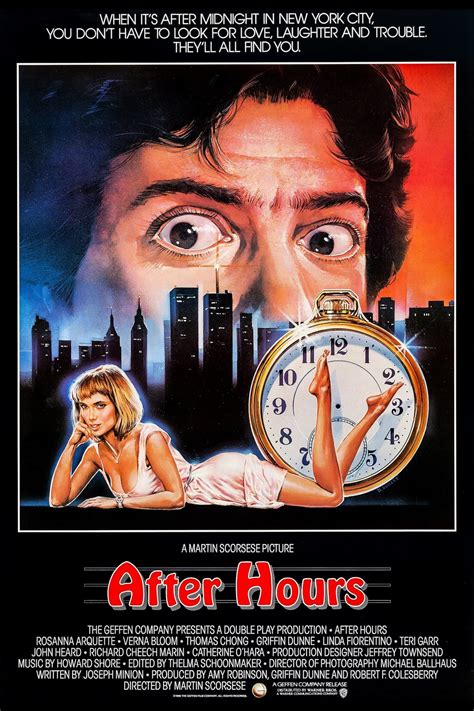After Hours

Description:
After Hours is a black comedy film that follows the surreal and often bizarre night of Paul Hackett, a word processor in New York City. After meeting a woman named Marcy, Paul's night spirals into a series of misadventures and encounters with eccentric characters. As he attempts to return home, he faces misunderstandings, mistaken identities, and the growing chaos of the city's nightlife, blending humor with a dark exploration of urban alienation.Keywords:
Surrealism, Nightmare, Dark Humor, Absurdity, Urban ChaosIs After Hours a good movie?
"After Hours," directed by Martin Scorsese and released in 1985, is often regarded as a cult classic. The film follows a man's chaotic night in New York City, filled with bizarre encounters and darkly comedic situations. Its unique blend of suspense, humor, and surrealism, along with strong performances, particularly by Griffin Dunne, has garnered praise. Critics appreciate its exploration of urban alienation and the unpredictability of life. While opinions on its appeal can vary, many consider it a notable entry in Scorsese's filmography.
What is the point of the After Hours movie?
Is After Hours based on the Odyssey?
"After Hours," directed by Martin Scorsese, is not directly based on Homer's "The Odyssey," but it does share thematic elements of a journey and the trials faced by the protagonist. The film follows Paul Hackett as he experiences a surreal and chaotic night in New York City, encountering a series of bizarre characters and situations that test his resolve. This can be seen as a modern, urban odyssey, reflecting the unpredictable nature of life and the challenges one faces in unfamiliar territory.
What is the movie After Hours about?
"After Hours" is a 1985 dark comedy film directed by Martin Scorsese. It follows Paul Hackett, a mild-mannered word processor, who experiences a night of misadventures in New York City's Soho district. After meeting a woman named Marcy in a café, Paul is drawn into a bizarre series of events that include encounters with eccentric characters, misunderstandings, and escalating chaos. As the night unfolds, his attempts to return home become increasingly absurd, highlighting themes of anxiety and the unpredictability of urban life.
Explore More Categories: